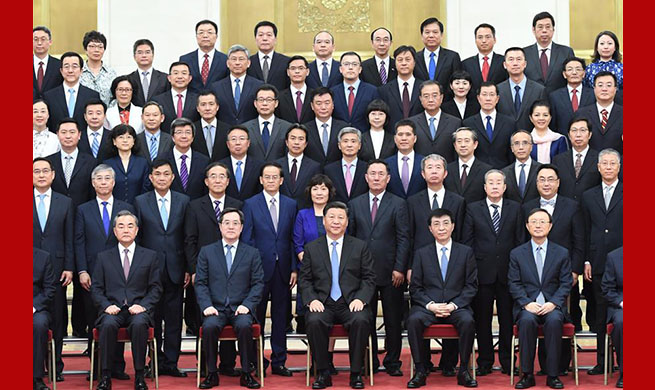by Stephanie Wolff
BERLIN, July 18 (Xinhua) -- Germany is currently engaged in a political tug-of-war over the introduction of a price on carbon dioxide (CO2) to ramp up its climate protection efforts.
In order to meet its national emissions targets, the German government intends to propose a major legislative package complete with support programs, new regulations and a CO2 price in September.
While Germany's government aims to set a price on carbon emissions to promote climate-friendly technologies and behaviors, it has pledged not to penalize low-income citizens or to endanger the country's economy.
At the beginning of July, German Environment Minister Svenja Schulze from the Social Democratic Party proposed a "socially acceptable" CO2 tax that would gradually make heating and fuels more expensive from 2020.
According to Schulze's proposal, revenues from the CO2 tax would flow back to German citizens as a "climate premium" and the tax would not put an additional financial burden on low and middle income earners.
Instead, "those who behave in a climate-friendly manner will be rewarded in future," Schulze emphasized.
Last Friday, the German Council of Economic Experts (GCEE), which advises the German government, finally recommended that CO2 emissions from buildings and transport be made more expensive through a carbon price.
"A CO2 price is the central instrument to get the problem of climate change under control," Ottmar Edenhofer, director of the Potsdam Institute for Climate Impact Research, which contributed significantly to the expert report, told Xinhua.
A carbon price "sets the right signals for the market" and would be the only way to ensure that "the costs of climate protection remain as low as possible," Edenhofer said.
The GCEE made it clear, however, that including the transport and buildings sectors in the European Union (EU) Emissions Trading Scheme (ETS) would be the best way to reduce greenhouse gas emissions in the long term.
German Chancellor Angela Merkel has welcomed the fact that the economic experts encouraged her government to "take market-based paths" and not to rely solely on regulatory measures. At the same time, Merkel emphasized that there would still be "broad discussions" on carbon pricing in Germany and there could be "no simple decisions."
Germany is on course to miss its 2020 climate target of reducing greenhouse gas emissions by 40 percent compared to 1990 levels. According to the government's climate protection report for 2018, Germany will only achieve a 32 percent emissions reduction by next year.
The environmental NGO Germanwatch sees a trend in Europe as well as internationally, which favors the introduction of CO2 prices in addition to emissions trading systems, such as the EU ETS.
"CO2 pricing in transport and buildings in Germany should start in 2020 in order to significantly increase the speed at which emissions are reduced," Oldag Caspar, Germanwatch team leader for German and European low-carbon policy, told Xinhua.
Although emissions from the German transport sector have stagnated since 1990 and fell slightly last year, the government's target of reducing transport emissions by up to 42 percent by 2030 would not be reached at the current pace, according to the Federal Environment Agency.
While Minister Schulze had spoken out in favor of a flat carbon tax as early as April, Germany's political parties are at odds over how a CO2 price could be implemented.
German Economic Affairs Minister Peter Altmaier from the Christian Democratic Union party has rejected the flat carbon tax "because it burdens many people without sustainably reducing CO2 emissions."
The scientific advisory board of Altmaier's ministry has proposed significantly reducing and reforming taxes and levies on energy in Germany as well as abolishing the Renewable Energy Sources Act (EEG) levy, which had been used to finance the country's energy transition.
Instead, the German Economic Affairs Ministry seeks to use a CO2 price from emissions trading to incentivize domestic companies and citizens to invest in climate protection where it is "most cost-effective."
Anton Hofreiter, leader of the Green Party's parliamentary group in the German Bundestag, has warned that "we do not have time for a long competition of ideas. In view of the dramatic nature of the climate crisis, action must now be taken quickly."
The Green Party in Germany is calling for a carbon tax with a minimum price of 40 euros (44.86 U.S. dollars) per ton of CO2. In return, the German electricity tax should be largely abolished and each German citizen should receive 100 euros each year.
In contrast, the German liberal Free Democrats (FDP) have consistently rejected a CO2 tax and called for the transport and buildings sectors to be integrated in the EU ETS. FDP climate politician Lukas Koehler said that "an arbitrarily fixed CO2 tax is a dangerous climate gamble."
In an attempt to find a political middle ground, the leader of the German Christian Democrats, newly appointed Defense Minister Annegret Kramp-Karrenbauer, recently announced that she would invite the other political parties after the summer break to discuss "common solutions" in climate protection policy.
"I am convinced that we need a national climate consensus" because it would not be sufficient to only agree within the government, Kramp-Karrenbauer told the public broadcaster ZDF.
Support for a CO2 tax also came from the somewhat unlikely alliance of German business associations and trade unions in the form of the Federation of German Industries, the Federation of German Trade Unions and the Association of German Chambers of Commerce and Industry (DIHK).
In a joint position paper, the alliance called for the introduction of carbon pricing through taxation as this would offer more planning security to allow German companies and consumers to adapt to the changing tax and to invest in environmentally-friendly alternatives.
At the same time, the DIHK warned against placing additional burdens on German companies through new rules and stressed that climate protection is most effective if there is a global consensus.
"The concept that is ultimately selected must therefore at least be compatible with European regulations in order to avoid competitive disadvantages for the German economy," DIHK President Eric Schweitzer told the newspaper Rheinische Post.
Public support for a carbon tax in Germany has remained underwhelming, despite polls showing that a large majority of Germans believe that more climate action is needed. A recent survey conducted by the public broadcaster ARD found that only 39 percent of Germans supported a CO2 tax, compared to 57 percent, who did not think a CO2 tax made sense.
However, the survey also showed that almost nine out of ten Germans saw a need, or even a "very significant" need, for more action to protect the climate, while just as many Germans thought that their country "should set a good example" in climate protection.
The outcome of the ongoing debate over a carbon price in Germany will be closely watched by Germany's European partners. Something resembling a compromise is likely to emerge by September, when the German government aims to present its plans for more ambitious climate protection measures.
"Politicians in Germany will probably opt for a tax solution or a hybrid system in the transport and buildings sectors," Germanwatch team leader Caspar told Xinhua. Nonetheless, a tax would still be "more predictable for people and can also come faster."
Overall, the CO2 price debate reflects Germany's struggle to find an answer to the question of who will pay the bill for a more ambitious climate policy which, inevitably, will be an all-round expensive endeavor.













